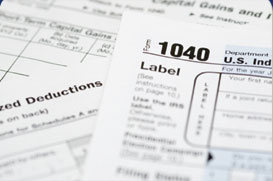
Do Your Homework on Back-to-School Tax Breaks
IRS Publishes 2016 HSA Contribution Limits
Businesses Say 'Taxes are a Hassle'
Health Care Law Survives Supreme Court Challenge.
Scammers Want to Take Your Vacation
Education tax planning can optimize the available breaks for saving and paying for school expenses. Here are some tips.
Saving for Education
Section 529 plans include prepaid tuition programs and college savings accounts. Prepaid tuition programs let you buy future tuition credits at today's rates, while college savings accounts let you set aside funds in an investment account. You get no tax deduction, but you can use the money tax-free for qualified college expenses
Coverdell education savings accounts have some characteristics of Section 529 plans - and a few important differences. Nondeductible annual contributions of $2,000 can be made not only for qualified college costs, but also for many K-12 expenses. Unlike 529 plans, phase-out rules prevent contributions when your income exceeds certain levels.
Paying for Education
If you're currently paying college expenses, your tax planning should take the various available deductions and credits into account. These include the American opportunity credit, the lifetime learning credit, and the student loan interest deduction.
If you have education expenses to pay now or in the future, planning will help you take advantage of the tax breaks. Contact us for details and assistance.
The IRS recently announced inflation-adjusted contribution limits for health savings accounts (HSAs) for 2016. HSAs are a combination of a high-deductible health insurance plan and a savings account in which you set aside pretax dollars that can be withdrawn tax-free to pay unreimbursed medical expenses. The 2016 HSA contribution limit for individuals is $3,350; the limit for family coverage is $6,750. You can make a catch-up contribution of an additional $1,000 when you're 55 or older.
In a survey of small businesses conducted by the National Small Business Association, 59% of respondents said taxes were more of an administrative burden than a financial one. Most businesses put payroll taxes at the top of the list of taxes with the greatest administrative burden. Payroll taxes also outranked other taxes, such as income, property, and sales taxes, as the top financial burden to businesses.
On June 25, the U.S. Supreme Court issued its ruling on the controversial King v. Burwell case.
The main issue in the case was whether federal subsidies could be offered to people who purchased health insurance through the federal health insurance marketplace rather than through a state-run exchange. Under a literal reading of the law, subsidies are allowed through exchanges "established by the state." It was argued that the wording of the Affordable Care Act (ACA) prohibits subsidies from being granted in states that did not set up their own insurance exchange, but instead defaulted to the federal health insurance marketplace. More than half of the states use the federal exchange.
Had the Court's decision gone the other way, an estimated six million people would have lost the subsidies that help them pay for their health insurance. However, the Supreme Court decided by a 6-3 margin that this distinction between state and federal exchanges was not the intent of Congress and ruled to preserve the right for subsidies to be offered in all states. The majority opinion was written by Chief Justice Roberts.
Buyer beware! Both the Better Business Bureau and the Federal Trade Commission have issued warnings about vacation fraud. By some estimates, this type of scam costs travelers over $10 billion each year. How do you know whether you're dealing with a legitimate travel agent or a huckster?
Here are Pointers:
Do Your Research.
Get contact information for hotels, rental car companies, and airlines; then confirm reservations and prices directly. Research properties on the Internet before you travel. (Is that "five star hotel" really near the beach?) Check out the Better Business Bureau. Although bad companies may not always appear on BBB radar, a history of complaints is a tip-off that you're dealing with a less-than-reputable firm.
Get it in Writing. Obtain a copy of the firm's cancellation and refund policies. Get written confirmation of your travel arrangements. Read the fine print, especially verbiage about availability of travel dates and additional charges.
Beware the Bait and Switch. You don't want to learn the hard way that "luxury" has an unexpected definition. In one scam, a "luxury" Caribbean cruise booked for dollars a day was actually a six-hour ferry ride. In another, a "luxury" hotel was located next to the city dump. Of course, the travel company will be glad to move you to better accommodations - for a hefty fee.
Say "no" to High-Pressure Sales Tactics. If the salesperson says you're missing the deal of a lifetime and you're a fool to pass it up, walk away. Reputable firms want your business and will be happy to let you think over an offer.
Pay with a Credit Card. If a company asks for an overnight payment or cash in advance, go elsewhere. Legitimate companies will bill your credit card in the normal course of business. In addition, your card offers travel protection such as accident insurance.
The idea of saving money can be alluring. But remember that "too good to be true" is a clich for a reason. Don't let fraudsters take your dream vacation.



